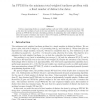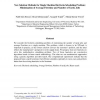13 search results - page 1 / 3 » Bi-criteria scheduling problems: Number of tardy jobs and ma... |
EOR
2007
13 years 9 months ago
2007
Consider a single machine and a set of jobs that are available for processing at time 0. Job ¡ has a processing time ¢¤£ , a due date ¥¦£ and a weight §¨£ . We consid...
COCOON
2009
Springer
13 years 7 months ago
2009
Springer
Given a sequencing of jobs on a single machine, each one with a weight, processing time, and a due date, the tardiness of a job is the time needed for its completion beyond its du...
COR
2011
2011
A hybrid shifting bottleneck-tabu search heuristic for the job shop total weighted tardiness problem
13 years 4 months ago
: In this paper, we study the job shop scheduling problem with the objective of minimizing the total weighted tardiness. We propose a hybrid shifting bottleneck - tabu search (SB-T...
EOR
2010
13 years 6 months ago
2010
We consider the bicriteria scheduling problem of minimizing the number of tardy jobs and average flowtime on a single machine. This problem, which is known to be NP-hard, is impor...
IEAAIE
2005
Springer
14 years 2 months ago
2005
Springer
In this paper, a multi-objective genetic algorithm is proposed to deal with a real-world fuzzy job shop scheduling problem. Fuzzy sets are used to model uncertain due dates and pro...


